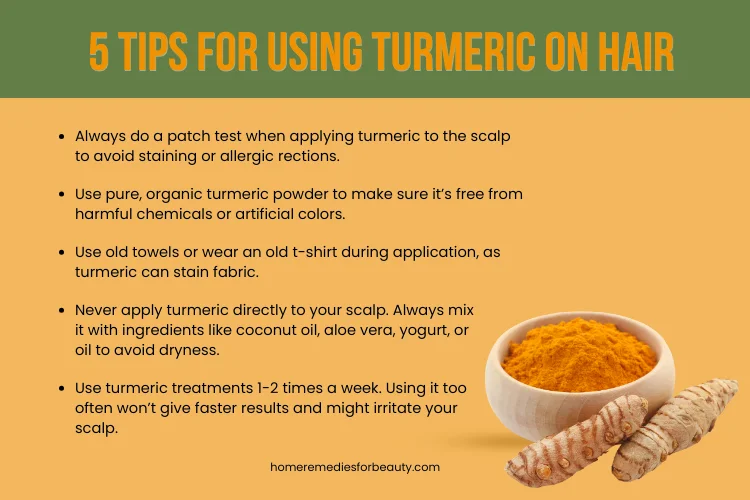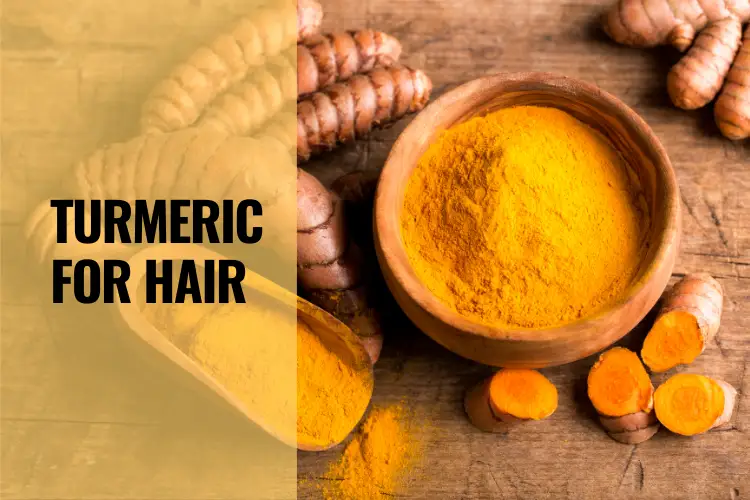Turmeric is a bright yellow spice used for centuries in traditional medicine. It contains curcumin, a natural compound with anti-inflammatory and antimicrobial properties.
These qualities may help calm scalp irritation and reduce dandruff, which can improve overall scalp health.
While direct scientific evidence on turmeric’s effect on hair growth is limited, its long history of use and beneficial properties make it a popular natural option for hair care.
In this article, we’ll explore turmeric’s benefits for hair and share easy ways to use it.
What is Turmeric and Where Does It Come From?
Turmeric is a bright yellow spice also called “Indian saffron”. It comes from the root of a plant called Curcuma longa, which is part of the ginger family. It mostly grows in warm places like India and South Asia.
People have used turmeric for a long time in traditional medicine because it helps with swelling, fighting germs, and protecting the body.
Today, turmeric is used not just in cooking but also to help with inflammation, skin problems, and hair and scalp health.
Is Turmeric Good for All Types of Hair?
Turmeric can be helpful for all types of hair. Whether your hair is straight, curly, or wavy, this golden spice may help calm the scalp and reduce inflammation, which is important for maintaining healthy hair.
Some studies suggest that turmeric may improve scalp conditions like psoriasis. And when your scalp is clean and balanced, your hair has a better chance of growing strong.
The key compound in turmeric, curcumin, has anti-inflammatory and antioxidant properties. These may help reduce hair fall and support long-term growth, which is why turmeric is now included in many natural hair care routines.
Benefits of Turmeric for Hair
Turmeric has strong anti-inflammatory properties, which can make it helpful for hair and scalp health. That’s why it’s often added to shampoos, conditioners, masks, and oils. Using turmeric in your hair care routine may offer several benefits for both your scalp and hair.
1. Reduces Hair Loss
Turmeric may help reduce hair loss by addressing inflammation, one of the root causes of thinning hair.
A 2021 study published in the Journal of Controlled Release found that curcumin (the active compound in turmeric), when used in nanocrystal form, was able to reach deep into hair follicles. This deeper delivery could help treat scalp inflammation more effectively, which may support healthier hair growth over time.
Its antioxidant effects may also protect hair follicles from damage caused by free radicals, creating a better environment for stronger, fuller hair.
2. Helps Fight Dandruff
Turmeric has natural antifungal and anti-inflammatory properties that may help reduce dandruff.
Dandruff often appears due to an irritated or oily scalp and the growth of a fungus called Malassezia. Turmeric can help soothe the scalp, reduce itching, and fight the growth of this fungus.
Many people add it to hair masks or use turmeric-infused oils to keep their scalp healthy and dandruff-free.
3. Protect Against Environmental Damage
Turmeric helps protect hair and scalp from damage caused by pollution, sunlight, and harsh weather. These environmental factors can create harmful molecules called free radicals that weaken hair and damage the scalp.
The antioxidants in turmeric fight off these harmful molecules, helping to keep your hair strong and your scalp healthy. This protection can help restore damaged hair and support better hair growth.
4. Improves Scalp Health
A healthy scalp is key to strong hair growth. Turmeric’s soothing and anti-inflammatory properties can help reduce irritation and support overall scalp health.
Some research has even found that using a turmeric-based tonic may ease symptoms of scalp psoriasis and help people feel more comfortable.
5. Controls Excess Oil
Turmeric has natural antibacterial and astringent properties that may help reduce excess oil on the scalp.
By keeping the scalp clean and free from oil buildup and bacteria, turmeric can help prevent issues like greasy roots and clogged follicles.
6. May Promote Hair Growth
Curcumin in turmeric may stimulate hair follicle stem cells and improve blood circulation to the scalp, increasing hair growth.
Its antimicrobial properties can help fight off scalp infections, creating a cleaner environment that supports hair growth.
Additionally, turmeric contains small amounts of vitamin C, which helps the body produce collagen. Collagen is important for keeping the scalp healthy and supporting hair growth.
However, the vitamin C content in turmeric is low, so it should be combined with other vitamin C-rich foods for best results.
How to Use Turmeric for Hair: 3 DIY Remedies
Turmeric is a great natural boost for your hair. Its calming, antioxidant, and germ-fighting properties help keep your scalp healthy, which is important for strong hair growth. Here are 3 easy DIY remedies for your hair that you can try at home:
1. Turmeric-Coconut Oil Scalp Mask
Coconut oil hydrates the scalp and helps turmeric’s active compound, curcumin, absorb into the hair follicles. This combo improves scalp health and reduces inflammation.
Ingredients:
- 1 tablespoon turmeric powder (organic)
- 2 tablespoons coconut oil (extra virgin)
Instructions:
- Combine turmeric powder with coconut oil and stir until you get a smooth, even mixture.
- Gently apply it to your scalp and massage using small, circular movements to help it absorb.
- Leave it on for 30 to 45 minutes.
- Rinse thoroughly with a mild shampoo.
Frequency:
2. Turmeric and Aloe Vera Scalp Treatment
Aloe vera and turmeric together calm an irritated scalp and promote new hair growth. Aloe vera cools and soothes the scalp, helping with dryness and itching.
Turmeric, on the other hand, has powerful anti-inflammatory and antibacterial properties that help fight scalp infections and reduce redness or irritation. When used together, they keep your scalp healthy, which can help your hair grow better.
Ingredients:
- 1 teaspoon turmeric powder
- 2 tablespoons fresh aloe vera gel
Instructions:
- Mix turmeric and aloe vera gel well until the texture feels right for your scalp.
- Apply directly to the scalp.
- Let it sit for 15 to 20 minutes.
- Rinse with water.
Frequency:
- For best results, use this treatment twice a week.
3. Turmeric and Ginger Scalp Scrub
Ginger boosts blood circulation while turmeric reduces inflammation. This scrub exfoliates dead skin and stimulates the scalp, potentially encouraging new hair growth.
Ingredients:
- 1 tablespoon turmeric powder
- 1 tablespoon ginger juice (freshly grated and strained)
- 2 tablespoons olive oil or castor oil
- 1 tablespoon sugar (for exfoliation)
Instructions:
- Mix all ingredients into a gritty paste.
- Gently massage into your scalp 2 to 3 times.
- Let it sit for 10 to 15 minutes before rinsing.
- Rinse well and follow with shampoo.
Frequency:
Can Turmeric Help with Hair Loss?
Hair loss is common and can happen slowly or suddenly. It’s stressful to see your hair thinning or falling out, but knowing the cause can help.
- Genetics
- Hormonal Changes
- Lack of nutrients
- Stress
- Rapid Weight Loss
- Health problems
- Certain medicines
- Using harsh hair products or heat tools
Some causes, like genetics, can’t be changed. But others can be managed with good care and the right treatment.
Turmeric is bright yellow spice with healing properties, contains curcumin, its main active compound. Curcumin is a powerful antioxidant with natural anti-inflammatory effects. It may help soothe scalp issues and reduce inflammation, creating g healthier environment for hair to grow.
One study found that Curcuma aeruginosa (a type of turmeric) helped improve hair growth in men when combined with 5% minoxidil, a common hair loss treatment. This suggests that turmeric might boost results when used alongside proven treatments.
found that Curcuma aeruginosa, a type of turmeric, helped men with baldness. It combined the turmeric extract with 5% minoxidil, a common hair loss treatment. This suggests that turmeric may help with hair loss. It may work best with other treatments.
Some research shows that curcumin may help lower DHT, the hormone often linked to hair loss. It does this by blocking an enzyme called 5α-reductase, which turns testosterone into DHT.
One study using turmeric extract (Curcuma aeruginosa) found that it helped improve hair growth when combined with minoxidil.
5 Tips for Using Turmeric

What Are the Side Effects of Turmeric on Hair?
Turmeric is mostly safe to use, but if you use too much or have sensitive skin, it can sometimes cause irritation like itching, redness, or burning. That’s why it’s a good idea to do a patch test before putting it on your scalp.
Also, turmeric’s yellow color can leave stains on light-colored hair or skin, so be careful with that.
If you use turmeric too often or don’t wash it out well, it might make your hair dry or cause buildup on your scalp, which can affect hair growth.
Sometimes turmeric can react with other hair products and change how they work or affect the color or texture of your hair.
WebMD says that turmeric is safe when used in small amounts for a short time, but using too much or for too long might cause mild side effects like nausea or dizziness in some people.
When to Avoid Turmeric on Your Hair
Although turmeric is usually safe, there are some times when you should avoid using it on your hair:
- If you are allergic to turmeric.
- If your scalp has cuts, rashes, or is very sensitive.
- If you have very sensitive skin that reacts easily to new products.
- If you are using strong chemical treatments or hair dyes, turmeric might react and cause unwanted effects.
- If you are pregnant or breastfeeding, it’s best to check with a doctor before using turmeric on your scalp.
In these cases, it’s safer to avoid turmeric or talk to a healthcare professional first.
Final Thoughts on Turmeric for Hair
Turmeric can be a helpful natural ingredient for your hair. Its anti-inflammatory and antioxidant properties may calm the scalp, reduce dandruff, and even support hair growth.
But like any remedy, it’s important to use it the right way.
Start slow, always do a patch test, and don’t overuse it. Turmeric works best when combined with a healthy hair care routine.
You can add it through DIY hair masks, shampoos, or even supplements to help support your hair health naturally.
Remember: These remedies are supportive, not a cure for hair loss. If you have a medical condition like alopecia, consult a dermatologist.
FAQs About Turmeric
Can turmeric cause permanent hair loss?
No, turmeric does not cause permanent hair loss. However, if you use it in high amount or have sensitive skin, it might irritate your scalp temporarily. Always use it carefully and do a patch test.
Can I use turmeric powder on my hair?
Yes, you can use turmeric powder on your hair. It’s best to mix it with oil, yogurt, or water to make a paste and apply it as a mask. Remember to do a patch test to avoid any allergic reaction.
How often should I use turmeric on my hair?
Once or twice a week is enough. Using it too often might dry out your hair or cause buildup on your scalp.
Does drinking turmeric water help in hair growth?
Drinking turmeric water may help improve overall health and reduce inflammation, which can support hair growth. But it’s not a guaranteed or quick fix for hair loss.
Sources we trust:
